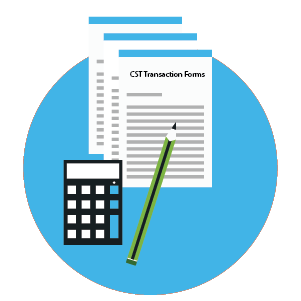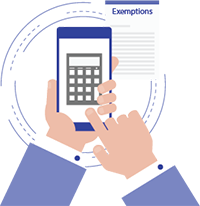
Understanding Central Sales Tax
Central Sales Tax or CST is referred to as the tax imposed upon the sales generated because of inter-state business trade. Central Sales Tax is an indirect tax that falls on the customers and it is payable to the government of the state where the product is being sold.
As per Indian Constitution, no state is entitled to demand sales tax on sales or purchase of goods that occurs between interstate trade and commerce. The Constitution states that only the parliament has the authority to levy tax during interstate business transactions. In the year 1956, Central Sales Tax Act was presented, this Act formulates the different fundamentals for determining when goods transactions take place during interstate trade or commerce. The CST Act, 1956 also issued a declaration of certain goods to be provided special value in inter-state trade or commerce by laying down restrictions on tax imposition on such items.
Documents you need to submit for Central Sales Tax
To register for Central Sales Tax, one must furnish a TIN registration number. Producing a Taxpayer Identification Number is the first step, after which the applicant is required to fill the necessary forms and pay a registration fee.
Anyone registering for Central Sales Tax must provide the following documents:
- A Government approved ID proof.
- Address Proof.
- PAN card details.
- Passport sized photographs.
- Address proof for the business establishment.
- Purchase invoice.
- Bank statement.
- Security or Reference.
The documents required for registering CST may, however, vary from one state to another.

The Complete Guidelines to Goods and Service Tax Get Details
CST Transaction Forms
Every manufacturer, trader, exporter or dealer must issue certain statements in the order form to sellers and buyers during the transaction. The Sales Tax Authorities supply the forms.
The different types of forms are as follows:
Form C: This form is submitted when the sales tax on an inter-state sale is 4%. The buyer in such case must be registered under CST so that the sale of goods is covered in the registration certificate of the purchasing dealer. The purchasing dealer becomes eligible for a concessional rate of tax exemption if a declaration in Form C is submitted to the seller.
Form D: If the government purchases goods from dealers, the tax rate is 4% and to avail this concession, Form D is issued by the government department who has made the purchase.
Form E1: Form E1 is required to claim CST exemption for the purchasers during any first-time, inter-state sale of goods.
Form E2: When goods move from one state to another Form E2 is issued by the second or the following seller in the order of interstate sales by transfer. This form allows the purchaser to claim exemption from CST.

Form F: When goods are shipped off to another state or transferred to a branch in another state, of the same dealer, then CST is not payable where only inter-state stock transfer happens without a sale. The dealer must produce a declaration in Form F to claim inter-state movement of goods issued by the Consignment Agent or Branch Office in another State.
Form H: Form H is supplied by exporters for goods purchase where the goods are sold for the export purpose. This form is submitted to claim a deduction on CST for the sold goods which are exported.
Form I: The dealer or buyer located in Special Economic Zone issues this form for giving concession as no CST is imposed in these regions.
Rate of Central Sales Tax
The rate of Central Sales Tax varies as per the situations. The tax rate for Service Tax and VAT are fixed, but CST does not have a fixed rate. The CST rate is also not entirely dependent upon the category of goods.
The applicability of CST rates can be categorized as;
For Declared Goods:
- When Form D is submitted during the sell, the tax rate is 4% of the sale or rate of State Sales Tax; whichever happens to be lower.
- Submission of Form C when a sale is made to a registered dealer for resale or use of manufacturing items imposes a tax rate of 4% or the rate of State Sales Tax; whichever is lower.
- Sale in any other case imposes a 2% VAT rate.
For Other Type of Goods:
- When Form D is submitted during the sell, the tax rate is 4% of the sale or rate of State Sales Tax; whichever happens to be lower.
- Submission of Form C when a sale is made to a registered dealer for resale or use of manufacturing items imposes a tax rate of 4% or the rate of State Sales Tax; whichever is lower.
- Sale in any other case imposes a 10% tax rate.
Everything To Know About Taxpayer Identification Number Get Details
Objectives of Central Sales Tax Act
The government launched the Central Sales Tax Act to simplify and for organizing tax collection in India.
Some of the main objectives of Central Sales Tax Act are mentioned below:
- Provide a smooth system for levying, collecting and distributing all the taxes accumulated through an interstate sale of goods and products.
- To set up a policy to track the sale and purchase of goods, related to interstate commerce.
- Categorizing certain class of goods because of its significance in trade and commerce.
- Establish a capable authority for settling any interstate disputes during a trade.
Central Sales Tax Exemptions
The exemption of Central Sales Tax is applicable in certain instances like:
- If a separate external freight is charged and if the external insurance of goods gets passed on to the buyer then CST is exempted.
- On the return of goods within 180 days there will be no CST charges.
- CST is not payable on installation, commissioning or when goods are rejected.
- Sales to Special Economic Zones (SEZ) and foreign missions are exempted from CST.

 Tax
Tax
 Income Tax
Income Tax
 Sales Tax
Sales Tax
 TDS
TDS
 GST
GST
 Service Tax
Service Tax
 VAT
VAT
 Tax Calculator
Tax Calculator













